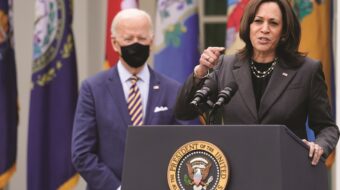WASHINGTON (PAI) The AFL-CIO favors a mixed public-private universal health care system, with government, business and individuals all sharing in its costs and with strong cost controls, including a government-run insurance alternative to keep the private insurance industry honest, federation President John Sweeney said.
His stand comes as a federation committee is still hashing out details, before the early-March AFL-CIO Executive Council meeting in Florida, about what type of health care system to push — and also as proponents of government-run single-payer health care gain increasing state and local union support. Its latest backers are the AFT in Vermont and the National Education Association’s Oregon statewide affiliate.
Sweeney, a founding member of the academy, spoke to the academy’s conference at the National Press Club as debate over what type of health care system the nation should have in the future erupted again. First, Obama insisted health care must be fundamentally restructured, with a ‘down payment’ on that by electronically computerizing medical records — part of his economic recovery bill. His goal is a complete health care overhaul, mixed public and private, by the end of his term.
And pickets who back government-run single-payer health care marched in front of the J.W. Marriott Hotel during a speech by Senate Finance Committee Chairman Max Baucus, D-Mont. Baucus flatly opposes single-payer government-run health care.
Single-payer would virtually eliminate the insurers, their high deductibles, 33% overhead, co-pays — and what the government says are 18,000 people who die yearly because the firms deny payment for care. Sweeney upped the number to 22,000 dead.
Sweeney told the crowd that entrenched special interests — he singled out the insurers — would oppose any effort at reforming the health care system, because they want to preserve their profits and control. But any effort at universal health care will fail without strong cost controls, he sternly warned.
‘It would seem that our economic collapse has added to our health care crisis — and that is certainly true. But it is also true that our health care crisis contributed greatly to our economic collapse,’ Sweeney commented. That’s because health care costs are out of control, showing the need for strong government regulation, he added,
Without it, companies that offer decent health care to their workers face a double-edged competition: Against foreign firms whose costs are lower because governments abroad pay for health care, and against domestic competitors whose costs are lower because they don’t. Business appears to now realize that, unlike in 1993, Sweeney said. Then, business sat on the sidelines during the pitched battle over the Clinton administration health care system plan.
Meanwhile, rising health care costs rob workers of raises and force them to take second or third jobs to pay or it, or do without, Sweeney added.
Obama ‘realizes that while the first bailout may have helped a lot of folks on Wall Street, what’s needed now is to put money directly into the pockets of consumers on Main Street with a much-needed economic recovery package. I submit to you, and to him, one of the most important things we can do to put more money into the pockets of the American people, in the short run as well as the long run, is to guarantee all families access to affordable health care.
‘Health care costs leech money from workers’ pockets…and are draining life from our economy and the time to stop the bleeding is not tomorrow, not the next day, or the next — but today,’ he declared.
The way to do that, he added — a way the insurers will spend millions of dollars to resist — is government cost controls, establishment of a government-run alternative system for those whose employers could not or would not insure them, and requiring everyone, including all employers, to shoulder the health care system’s costs.











Comments